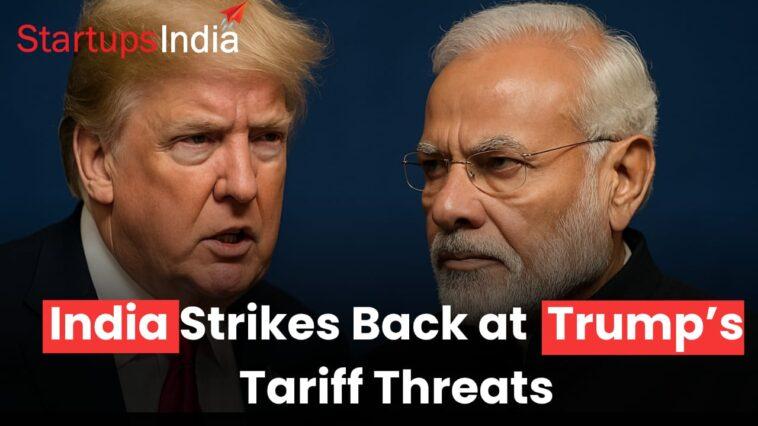India Strikes Back at Trump’s Tariff Threats: A Bold Stand for Energy Security
In a bold and calculated response, India has firmly pushed back against former U.S. President Donald Trump’s recent threats to impose higher tariffs on Indian goods. The core issue? India’s continued import of discounted Russian oil, a move that, according to Trump, supports Moscow amid the ongoing Ukraine conflict.
But India isn’t backing down. Instead, it’s doubling down on what it calls a matter of survival, not politics.
Why India Imports Russian Oil and Why It Matters
For a nation of 1.4 billion people, energy security isn’t a luxury; it’s a necessity. India imports nearly 85% of its crude oil, and Russian barrels offered at lower rates post-war sanctions have helped keep inflation under control and ensured affordable fuel across the country.
In fact, discounted Russian oil now makes up around 40% of India’s crude imports, or about 1.75 million barrels per day. These deals have saved the Indian economy billions and shielded businesses and consumers alike from the global energy price shocks.
At StartupsIndia, we recognise how critical such strategic decisions are for the startups India ecosystem. Affordable fuel directly impacts logistics, delivery startups, manufacturing, and even agritech ventures, all heavily reliant on stable energy prices.
Trump’s Accusation and India’s Rebuttal
Trump recently accused India of “profiting from war” by purchasing and re-exporting Russian oil, warning of “substantial” tariff increases on Indian exports to the U.S.
India’s Ministry of External Affairs (MEA) immediately hit back, calling the accusations “unjustified, one-sided, and hypocritical.” Officials pointed out that several Western countries, including the U.S. and the EU continue to import Russian commodities like uranium and palladium, even while criticising India.
India also defended its sovereign right to pursue an independent energy policy, stating clearly that national interest will not be sacrificed under external pressure.
“We won’t allow economic blackmail to override our commitment to providing affordable energy to our people,” a senior Indian official said.
What’s Really at Stake?
This conflict goes beyond oil. It’s about geopolitical leverage, economic diplomacy, and India’s refusal to be caught in a West-versus-East binary. India’s foreign policy today is multi-aligned, seeking partnerships with the U.S., Russia, and other global powers on equal terms.
A potential rise in U.S. tariffs could affect sectors like textiles, IT services, and auto components, all key export categories. But India seems prepared to weather the storm.
In this environment, the resilience of Indian startups becomes even more crucial. At startupsindia, we’re already seeing how homegrown tech, fintech, and green energy ventures are stepping up to reduce dependency on global shocks. From EV startups revolutionising last-mile delivery to agritech firms helping farmers manage fuel costs startups India are adapting quickly.
The Bigger Picture: A Moment of Strategic Clarity
India’s stand isn’t just a diplomatic message to Washington; it’s a statement to the world. As a growing economic powerhouse, India is asserting its right to choose pragmatism over politics. And in doing so, it’s also standing up for other Global South nations facing similar energy dilemmas.
For the startups India ecosystem, this clarity matters. It shows that the government will protect the economic foundations that entrepreneurs rely on—fuel stability, trade resilience, and strategic autonomy.
Conclusion: Standing Tall, Thinking Ahead
India’s pushback against Trump’s tariff threats is a defining moment in its foreign policy and economic strategy. With energy needs at the centre, the nation is signalling that it won’t be bullied into abandoning its best interests.
At startupsindia, we believe that this is also a time for startups to double down on innovation, build locally resilient solutions, and prepare for a global future where autonomy is strength.




GIPHY App Key not set. Please check settings